Maldives’ Yellow Brick Road to State of Emergency: Part I
by Azra Naseem
Despite State of Emergency, situation in Maldives remains calm and normal. There are no restrictions for visitors to travel to Maldives
— MFA-Maldives (@MDVForeign) November 4, 2015
On 4 November 2015, President Abdulla Yameen Abdul Gayoom declared a State of Emergency in the Maldives, suspending along with other laws seven different fundamental rights guaranteed by its democratic Constitution. Even as his Attorney General announced the executive decree, the Foreign Ministry led by Yameen’s niece, Dunya Maumoon, was reassuring the world everything was ‘calm and normal’ in the Maldives. Cognitive dissonance between simultaneous announcements and a world of difference between things said and things done, have been hallmarks of Yameen’s regime. The state of emergency is the latest development in a month during which the leader’s paranoid, perhaps even schizophrenic, delusions and hallucinations have become the lived experience of the Maldivian people. For now, the world is looking at the developments, aghast. Soon, however, its attention will wonder, and details of this extraordinary time in Maldivian history can easily be forgotten. This series will record some of the details for posterity, before the Gayooms re-write history as they have a habit of doing. This part discusses events along the road to the current state of emergency. Accounts of later developments will follow in shorter posts as events unfold.
The curious case of the exploding boat
On 28 September 2015 an explosion went off on President Yameen’s speedboat, Finifenmaa [Rose] as she cruised in to dock at the official presidential jetty in Male’. The President, his wife Fathmath Ibrahim, and an entourage of about twenty aides and associates were on board. The first couple were returning from Hajj (as all local media accounts of the incident were careful to note and repeat endlessly). The precise location of the explosion, as investigations later revealed, was right under the President’s usual seat. For whatever reason, it was First Lady Fathmath Ibrahim who took the President’s seat that day. Consequently, the President escaped unscathed. Lady Fathmath, however, remained in hospital until yesterday, reportedly nursing fractures to ‘bones connected to the spine’. 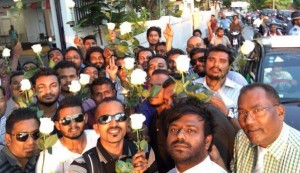 At first visited by many admirers, some of whom queued outside the hospital for hours with a white rose each to catch a glimpse of her, she was soon relegated to the back benches of national consciousness as events became progressively more dramatic with each day following the blast.
At first visited by many admirers, some of whom queued outside the hospital for hours with a white rose each to catch a glimpse of her, she was soon relegated to the back benches of national consciousness as events became progressively more dramatic with each day following the blast.
For several days after the explosion, there was silence from the president. The public was given no official explanation. The matter was being investigated, and there would be no comment. The people, along with the media, were left to speculate. Selected bits of information fed to the people included news of forensic teams arriving from the FBI, Sri Lanka and Saudi Arabia to ‘assist Maldives Police Service with the investigation’. They reportedly stayed on the president’s retreat on the island of Aarah, and collected samples from Finifenmaa. The main theory, fed by Presidential Affairs Minister, Mohamed Shareef, suggested the blast was an accident caused by an electric or mechanical failure.
An alternative narrative, suggested on 1 October 2015, came in the form of a blog post, ‘The man who wasn’t there’, written by a Dr Kharusath. It not only suggested the blast on Finifenmaa was deliberate, it also pointed the finger at Ahmed Adeeb, Yameen’s Vice President, as having planned and plotted the attack with the intention of killing Yameen. The writer suggested the young Adeeb’s failure to be at the airport to greet the President marked him as a guilty man. The post suggested that young Adeeb—a former model and footballer who has since put on a few stones and is known as a material boy who likes the finer things in life—had bought an expensive suit in anticipation of being sworn in as the new President that afternoon. At first the blog post went largely unnoticed.
On 7 October, 10 days after the blast, Yameen’s Spokesperson, Ibrahim Muaz Ali [or TV Mwah as he is called unofficially on social media], summoned the media for an extraordinary press conference at 1:00 in the morning. He showed reporters a video of the blast in slow-motion and officially, dramatically, declared the blast to have been an attempt to assassinate the president. No one was allowed to ask questions.
VIDEO: The explosion and the fire it caused in normal speed and slow motion. @Raajje_tv pic.twitter.com/VwN4TvgfpP — raajje.mv (@raajjemv) October 6, 2015
With confirmation that Yameen was investigating the blast as an attempt on his life, @Karusathey’s blog and its accusations against Adeeb began to take on more prominence. By then three members of the Maldives National Defence Force (MNDF), two of them with access to the state armoury, had been arrested. Two members of Adeeb’s security detail were also suspended indefinitely. The soldiers taken captive then are still under military detention.
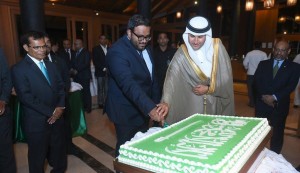 Adeeb appeared on Sangu, a television channel he funds, to defend himself and declare his unchanging loyalty to Yameen. “I will stand wherever Yameen tells me to.” Yameen allowed Adeeb to feed some cake to the increasing number of Saudi officials in the Maldives, then decided the best place for Adeeb at the time was China. On 13 October, two weeks after the ‘Finifenmaa Blast’, off he went to Beijing to represent Maldives at an investment forum to which no one came.
Adeeb appeared on Sangu, a television channel he funds, to defend himself and declare his unchanging loyalty to Yameen. “I will stand wherever Yameen tells me to.” Yameen allowed Adeeb to feed some cake to the increasing number of Saudi officials in the Maldives, then decided the best place for Adeeb at the time was China. On 13 October, two weeks after the ‘Finifenmaa Blast’, off he went to Beijing to represent Maldives at an investment forum to which no one came.
500% trust – #ItsTooMuch
On the same day Adeeb left for China, Yameen fired his second Defence Minister, Ex-army General Moosa Ali Jaleel, who was appointed to the post after Yameen’s first Defence Minister Mohamed Nazim was sentenced to 11 years in jail for planning to overthrow the government. Both Nazim and Jaleel were part of the events that prematurely ended former President Mohamed Nasheed’s government. Jaleel was also a close associate of Adeeb. Jaleel was fired but escaped jail, the fate of all others who cross Yameen. As it happens, he is a close family member of the Lady Fathmath. This, in Yameen’s court, is called due process.
While Adeeb was in China, Yameen gathered members of his ‘coalition’ together in what was said to be a ‘top secret’ meeting. It was akin to Don Corleone gathering The Family together. Phones were not allowed in, for confidentiality reasons. But, members of this family being Maldivian, proceedings were reported to the media almost verbatim by some participants as soon as they left Mulee Aage, The PPM’s Family Home. Some of what was said was meant to be ‘leaked’, like Yameen’s claim he had “500% trust” in his Vice President.
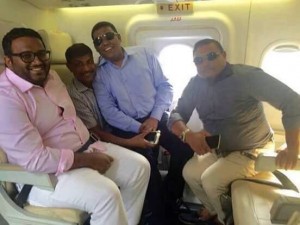 Some other matters were perhaps not meant to be revealed: like Yameen’s assertion that moneys MPs had been receiving [in envelopes outside of their hefty pay packets] came from his own stash and not Adeeb’s. In other words, the bribes they had been receiving came from Yameen and not Adeeb; the young Mr Vice President had merely been the Middle Man. MPs were assured their payments would continue—as long as they publicly declared, and proved, their loyalty to Yameen. All who had been copying up to Adeeb would do as Yameen asked–a majority of Maldivian MPs follow where the money leads.
Some other matters were perhaps not meant to be revealed: like Yameen’s assertion that moneys MPs had been receiving [in envelopes outside of their hefty pay packets] came from his own stash and not Adeeb’s. In other words, the bribes they had been receiving came from Yameen and not Adeeb; the young Mr Vice President had merely been the Middle Man. MPs were assured their payments would continue—as long as they publicly declared, and proved, their loyalty to Yameen. All who had been copying up to Adeeb would do as Yameen asked–a majority of Maldivian MPs follow where the money leads.
As is customary for Yameen, his words and actions were far removed from each other. He declared 500% trust in Adeeb but immediately after the statement, started raiding the homes and offices of Adeeb’s closest family members and associates. Among the most high profile searches were a police and army raid on the house of super-rich business man Hamid Ismail—or Hamid Seytu [Hamid from the corner shop] in common parlance—a member of Adeeb’s extended family. He was later arrested in Malaysia, and deported to Male’ against Malaysian laws. Hamid is now in jail; as is a man who took a picture of him arriving at the Male’ International Airport. Similar raids were conducted of the office of the Maldives Marketing and Public Relations Company (MMPRC) and of the home of its Managing Director Abdulla Ziyath, who is also now in jail. By then it was obvious Yameen’s so-called 500% trust in Adeeb was actually 500% percent suspicion. Nobody was surprised when Yameen decided to have Adeeb arrested on suspicion of involvement in the blast on the Finifenmaa.
On the eve of Adeeb’s early morning return from China on 24 October, Maldives Police Service closed off access to the so-called Green Zone—where protests and mass gatherings are banned for ‘security reasons’. The boundaries of this area is often fluid, moving according to whims of the security forces and have, at times, included the airport. The idea behind raising security levels in the Green Zone was supposedly to ‘protect Adeeb’ from an alleged threat to his life. It was another among hundreds of lies to the public by the government and security forces since the Finifenmaa saga began.In reality it was intended to stop Adeeb’s supporters from congregating at the airport, or at the jetties in Male’, to welcome him back. The police need not have bothered.
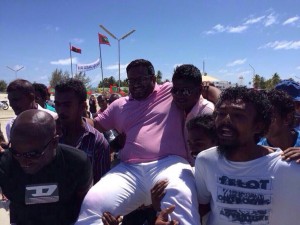 Adeeb’s ‘supporters’, who had deemed no burden too heavy to carry for their man, and seemed to number in their thousands at the height of his popularity—when he drove around town on motorbikes of various sizes with pockets full of money and bagfuls of swag—abandoned the VP before his plane touched down. Hundreds of t-shirts printed with his face, were dumped on the streets, cast aside like Adeeb himself.
Adeeb’s ‘supporters’, who had deemed no burden too heavy to carry for their man, and seemed to number in their thousands at the height of his popularity—when he drove around town on motorbikes of various sizes with pockets full of money and bagfuls of swag—abandoned the VP before his plane touched down. Hundreds of t-shirts printed with his face, were dumped on the streets, cast aside like Adeeb himself.
@NooshinWaheed I’m gonna leave this picture right here. pic.twitter.com/3tlrbwJOih
— MushfiqueMohamed (@mushfique_) October 24, 2015

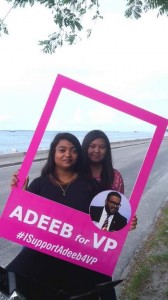 ‘Adeeb’s Babes’, a bevy of carefully groomed young women who framed themselves in pink to declare their support for him, never made it out on the streets in solidarity. Some stayed home with their t-shirts on and, shortly after, left the country altogether. And like many MPs who represent them, several hurried to delete all evidence of their support for Adeeb from the public sphere and began anew their efforts to cuddle up to Yameen instead.
‘Adeeb’s Babes’, a bevy of carefully groomed young women who framed themselves in pink to declare their support for him, never made it out on the streets in solidarity. Some stayed home with their t-shirts on and, shortly after, left the country altogether. And like many MPs who represent them, several hurried to delete all evidence of their support for Adeeb from the public sphere and began anew their efforts to cuddle up to Yameen instead.
Wasn’t me
The morning of 25 October brought the first public appearance of Abdulla Yameen Abdul Gayoom since the “assassination attempt.” It was a sour-faced, arrogant rant that lasted 45 minutes; a tirade in which he attempted to defend his track-record as a president who got rid of two Defence Ministers and two Vice Presidents in two short years of being a president. According to him, they all betrayed his trust and conspired against him. The last thing he wanted to do was get rid of them, but their betrayals left him with no choice. He accused Adeeb of colluding with MDP, failing to cooperate with the investigation into the blast, and also failing to side with police and military in their suspicions and activities against Hamid Ismail and Ziyath. Former Defence Minister and coup-maker Mohamed Nazim had tried to get members of the military to stand against their Commander in Chief.
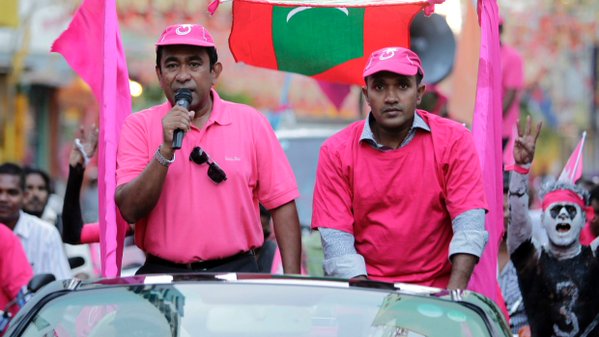 The first former Vice President, Mohamed Jameel Ahmed who wallowed knee-deep in pink with Yameen during the presidential campaign, had been totally incompetent, according to Yameen. [The Vice President, who fled the country ahead of impeachment, has been living in London. He married for the third time while in exile, and seems to have spent his honeymoon and all the days since Tweeting 140 character messages absolving himself of all the blame for unlawful actions taken by a government of which he was an integral part. All the while, he defines himself as ‘Former Vice President’ – to the man he is making all these accusations against.]
The first former Vice President, Mohamed Jameel Ahmed who wallowed knee-deep in pink with Yameen during the presidential campaign, had been totally incompetent, according to Yameen. [The Vice President, who fled the country ahead of impeachment, has been living in London. He married for the third time while in exile, and seems to have spent his honeymoon and all the days since Tweeting 140 character messages absolving himself of all the blame for unlawful actions taken by a government of which he was an integral part. All the while, he defines himself as ‘Former Vice President’ – to the man he is making all these accusations against.]
#Maldives Yameen clearly failed to manage a tiny population.He must not be allowed to destroy the paradise nation pic.twitter.com/lRx51tzNXe — Mohamed Jameel Ahmed (@MJameelAhmed) November 4, 2015
With former Vice President Dr.Jameel in London. Emmehaa Rayyithunnah varah vedhun dhannavaa. pic.twitter.com/BXFJSdqyvl
— Mohamed Maleeh Jamal (@maleehjamal) November 5, 2015
Yameen also assured in his speech that ‘youth associations’—which many took to be a euphemism for violent gangs with whom both Yameen and his VP are known to have intimate connections—will continue to get their moneys due through an alternative channel in the absence of Adeeb. He had never spoken at such length to Maldivians before, and thus had never before revealed the true extent of his paranoia and suspicions, or the level of his disgust for conventions and values of running a democratic government. Throughout it all he maintained he did not want to fire his Vice President, but had been left with no choice. Perhaps his own words below can paint a more accurate picture of his feelings:
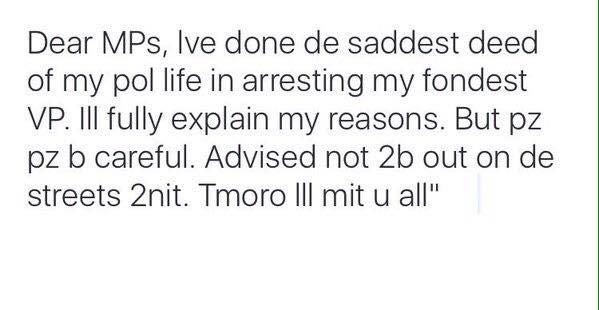
The gist of Yameen’s speech was that while the Vice President had been his closest ally, and had forced a Constitutional amendment to make Adeeb his deputy, he hadn’t a clue what the younger man had been up to. Everything wrong in the country since Yameen came to power was Adeeb’s doing. Yameen was as white and pure as a drop of coconut milk.
What followed the above is a week in which several bombs were found, lost, disposed of, transported live across Male’; forensic science was deemed hocus pocus; a State of Emergency was declared; MDP responded with an Emergency Tea Party; and a Sri Lankan fish buyer was arrested on suspicion of being an assassin. All this and more in The Yellow Brick Road, Part II.
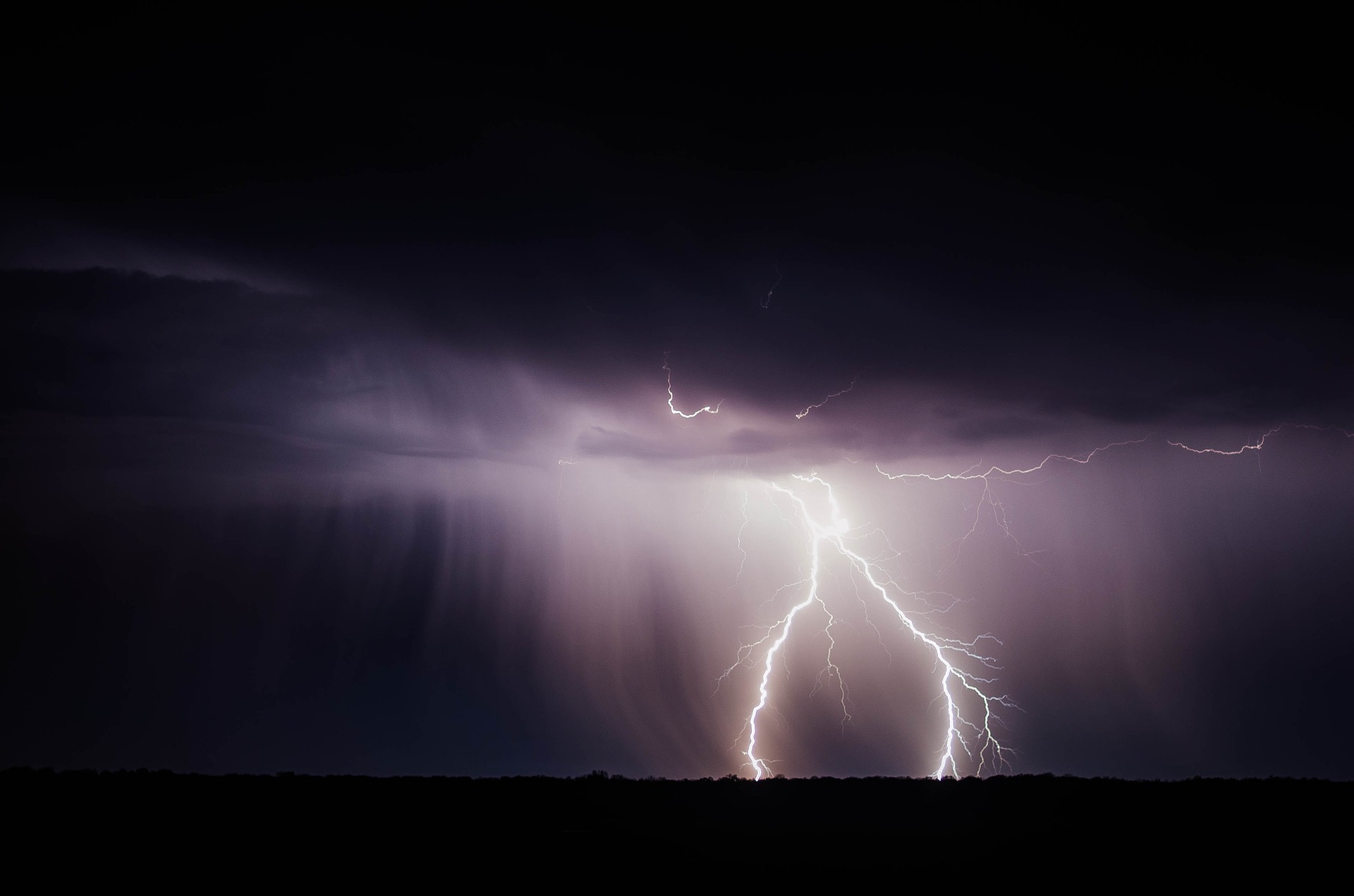
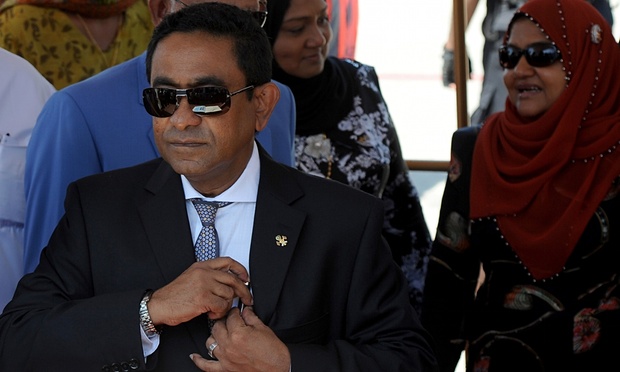
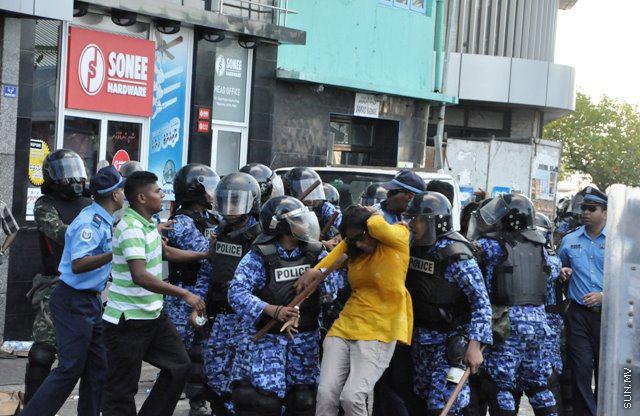
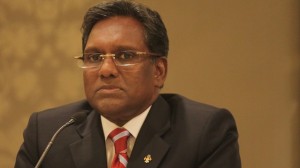 Once the controversial end to Nasheed’s government was accepted by CONI as ‘legal and constitutional’ with ‘no coup, no duress, no mutiny’, possibilities opened up for the ‘flawed democracy’ to change into a hybrid regime veering away from democracy towards competitive authoritarianism. When caretaker president Mohamed Waheed Hassan Manik took the reigns of the country, this is the direction in which he—with the Gayoom loyalists he signed with—firmly steered the country.
Once the controversial end to Nasheed’s government was accepted by CONI as ‘legal and constitutional’ with ‘no coup, no duress, no mutiny’, possibilities opened up for the ‘flawed democracy’ to change into a hybrid regime veering away from democracy towards competitive authoritarianism. When caretaker president Mohamed Waheed Hassan Manik took the reigns of the country, this is the direction in which he—with the Gayoom loyalists he signed with—firmly steered the country.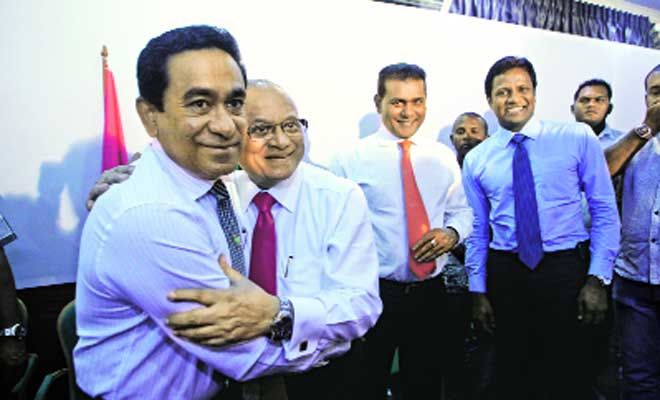
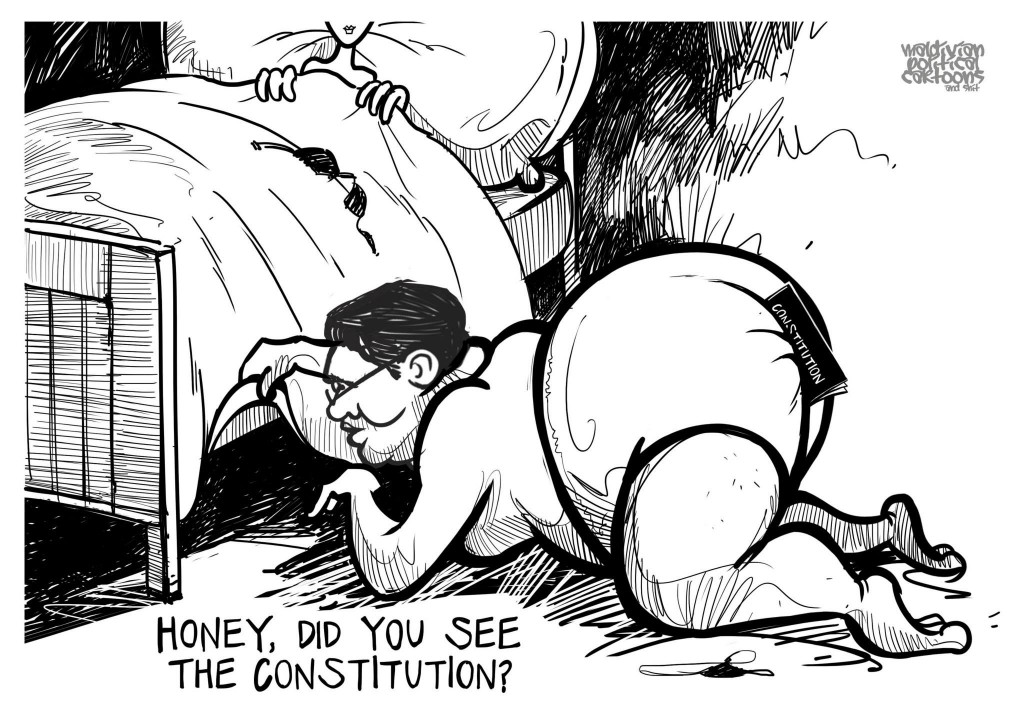 That the third arena—the judiciary—is under the complete control of the government is not an argument that anyone seriously contests, except the executive itself. Dozens of reports have been published by a whole range of international organisations from the UN to the ICJ censuring its lack of independence and corruption, and criticism has flowed from individual states, regional bodies and supranational entities. During Waheed’s competitive authoritarian regime, the widespread corruption, patronage and blackmail inherited from the Gayoom era remained in the judiciary. But there was room—although very little—for individual judges to express dissenting opinions. Several decisions by the executive since Yameen’s assumption of office, brought into effect via the compliant Majlis—such as the restructuring of the Supreme Court bench—have, however, destroyed any wriggle room for independent thought or action in the judiciary.
That the third arena—the judiciary—is under the complete control of the government is not an argument that anyone seriously contests, except the executive itself. Dozens of reports have been published by a whole range of international organisations from the UN to the ICJ censuring its lack of independence and corruption, and criticism has flowed from individual states, regional bodies and supranational entities. During Waheed’s competitive authoritarian regime, the widespread corruption, patronage and blackmail inherited from the Gayoom era remained in the judiciary. But there was room—although very little—for individual judges to express dissenting opinions. Several decisions by the executive since Yameen’s assumption of office, brought into effect via the compliant Majlis—such as the restructuring of the Supreme Court bench—have, however, destroyed any wriggle room for independent thought or action in the judiciary.